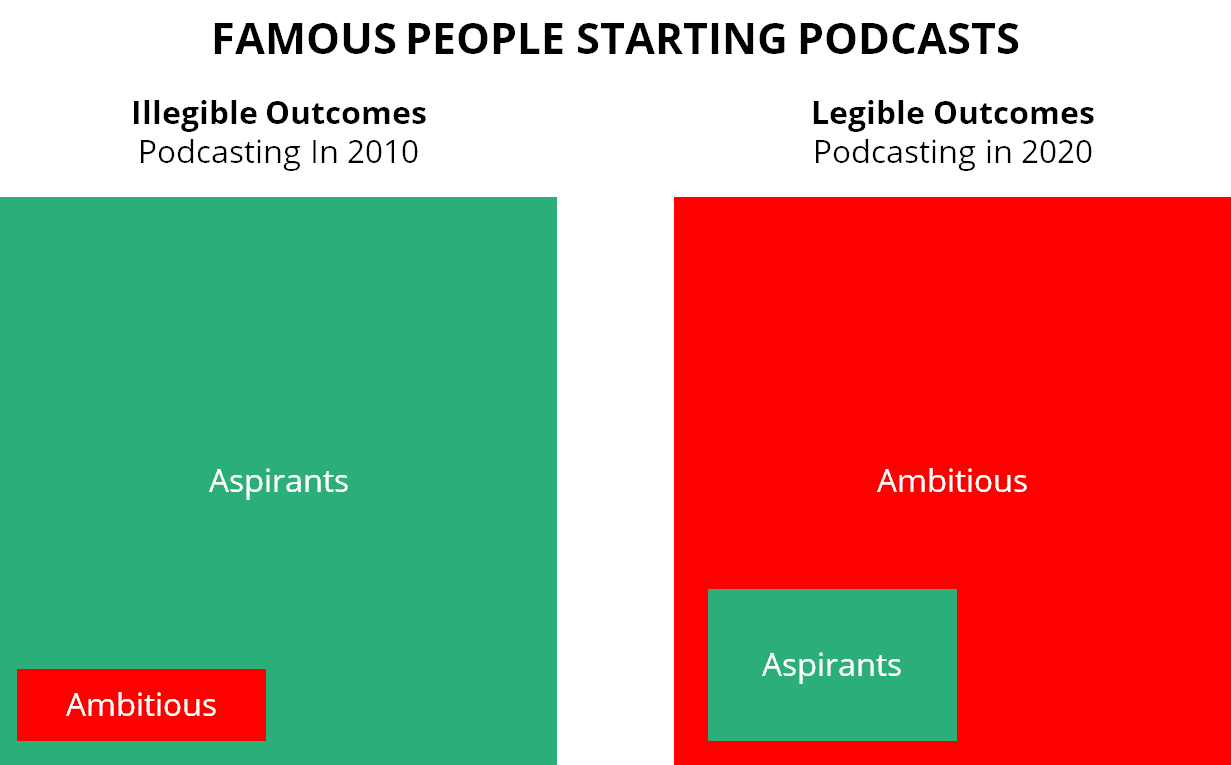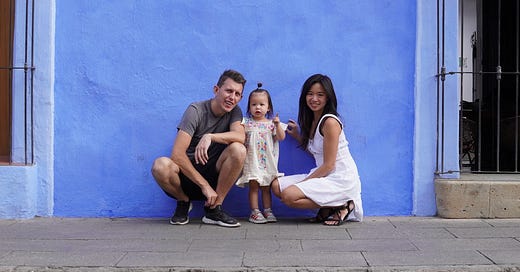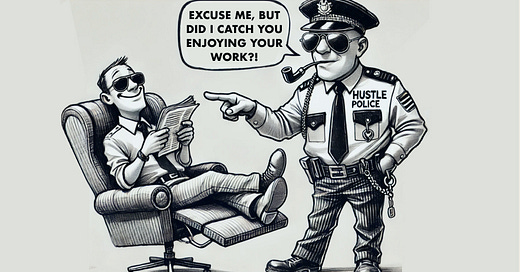#113: Are you ambitious or aspiring? (A book review of Agnes Callard's Aspiration)
📖 📚 What does it feel like to go after something that doesn't make sense?
October 24th, 2020: Greetings from Puerto Escondido! Here’s a shot from an eco-home in the neighborhood we visited this past weekend

This weeks issue is a book review of a book by Agnes Callard titled Aspiration: The Agency of Becoming (affiliate), which explores the process of change, aspiration, and ambition in our lives. I’m quite fond of her definition of aspiration and her thoughts on the issues with ambition in the modern age, which as you will see, it what drew me to this book.
If you’re stumbling on this from twitter or the web, join us here:
Aspiring On The Pathless Path
To others, I made a bold decision to quit my job and chart a different course in 2017. Yet in my own experience of the event, there was no singular moment or decision made. This disconnect between my own experience and the narrative of bold all-or-nothing leaps has mystified me and driven a lot of my own writing about the process.
I thought I was alone in pondering this question until I stumbled upon a small reference to Agnes Callard’s work in a New Yorker article about decision making. Here is that passage:
Agnes Callard, a philosopher at the University of Chicago, is skeptical about the idea of sudden transformation. She’s also convinced that, no matter how it looks or feels, we choose how we change. In her often moving, quietly profound book “Aspiration: The Agency of Becoming,” she writes that “becoming a parent is neither something that just happens to you nor something you decide to have happen to you.” Instead, Callard maintains, we “aspire” to self-transformation by trying on the values that we hope one day to possess.
Wow! There was someone else out there so mystified by the process of change that she wrote a whole book about it.
I ended up diving into the book and while it was a bit deep in academic philosophy, I also found it extremely valuable from the philosophical perspective of the big questions such as “what is good in life?“ and “how does one live a good life?” Along the way, through Callard’s contemplation on change, I developed a more nuanced perspective on how I thought about ambition and aspiration as well as how people change throughout their lives.
Beyond “all-or-nothing” leaps
We are convinced that life comes down to dramatic moments when one just decides to take a new path. This is reinforced by the storytelling we employ to describe our journeys. “When did you decide?” someone might ask us.
I’ve told many versions of my own journey with a good answer to that question, but deep down I never felt I was giving the whole truth. The truth was I didn’t really know. The path and choices just seemed to emerge.
Callard would say that instead of making a decision, I continued to decide along the way:
no decision magically transforms a person into someone with different values, preferences, etc. As a result, the transformative question can almost always resurface after it has been answered in the affirmative
To others my decision to quit my job may have looked like the important decision, but reflecting back it does not stand out as momentous. It was closer to what Callard describes - a continuation of a series of “yes, lets keep going” affirmations to myself.
Towards what? I wasn’t sure, but it sure as hell felt right.
Callard suggests this kind of aspiration carries with it an inherent uncertainty:
“The aspirant’s idea of the goodness of her end is characterized by a distinctive kind of vagueness, one she experiences as defective and in need of remedy.”
This is also the challenge in talking about these aspirations. Because of how hard they are to explain to others, they remain secret quests and additionally because people crave certainty, they search for clear maps that will help them figure out what to do. Unfortunately, the maps are much more useful for the ambitious.
Aspiration vs. Ambition
In my twenties, I was overcome by the overwhelming power of prestige, obsessed with acquiring impressive credentials. My experience of this is best described by Paul Graham in his essay on “doing what you love”:
Prestige is like a powerful magnet that warps even your beliefs about what you enjoy. It causes you to work not on what you like, but what you'd like to like.
Callard would say that I was swept up not by aspiration, but by ambition
An ambitious agent’s behavior is directed at a form of success whose value she is fully capable of grasping in advance of achieving it. Hence ambition is often directed at those goods—wealth, power, fame—that can be well appreciated even by those who do not have them.
I knew exactly what I was doing at the time when I was trying to work at a top strategy consulting firm and land a spot at a prestigious business school. The rewards were easy to understand and it was obvious that everyone else’s opinion of me would change when I acquired these credentials.
While the excitement of landing exclusive spots within these institutions was powerful, the feelings didn’t last. To combat this I was always looking towards the next thing, searching for a better hit of prestige. In reality, I was avoiding the deeper philosophical questions of what kind of like I actually wanted to live. Callard predicts that my kind of behavior would have left me feeling a bit empty:
But because ambition both consumes much of an agent’s efforts and does not expand his value horizons, it carries with it the danger of trapping him in what may be an impoverished appreciation of value.
I had set out to achieve a very legible set of outcomes yet along the way I never considered that this might mean that the values of appreciating these outcomes would be forced upon me whether they mattered to me or not. It took my ten years to decide to shift towards a new set of values even if I did not know how to get there.
The solely ambitious person already knows what they want. They want the title, the money or the status. In contrast, the aspirant doesn’t know what they want.
To aspire is to learn to see the world in a new way

The most powerful example that Callard offers is one of becoming a parent. It seems that this life change may almost be one of the most pure examples of an aspirational aim.
This might also explain why I have always found discussions among non-parents about the financial impossibilities of having children so awkward. While many people claim that they “can’t afford to have kids” I’ve always thought that this mindset would have to assume that someone who has kids would not change in the slightest. Callard would argue that people who aspire to be parents are usually aware that having kids will change them in some way that is hard to understand.
Callard says this is what aspiration is all about:
When one makes a radical life change, one does not submit oneself to be changed by some transformative event or object; one’s agency runs all the way through to the endpoint. The nature of that agency, as I shall argue, is one of learning: coming to acquire the value means learning to see the world in a new way.
This inherent uncertainty often causes people to postpone major life shifts even it is obvious that the shift is exactly what they seek. Callard again:
Perhaps in some cases it is possible to postpone the decision until one is better acquainted with the values and desires in question—but often it is not, because every step toward acquaintance also raises the costs of departure. Hence, the predicament of climactic choice is one of needing to decide whether the sacrifice is worthwhile before being able to accurately assess the value for the sake of which it would be made.
With parenthood, we can rely on the wisdom of generations before us to convince us to move towards that choice, but for many other modern decisions, we are often much less sure, which leads to many people putting off the big shifts they are drawn towards.
Who is aspiring and who is merely ambitious?

To determine whether one is driven by aspirational or ambitious aims can be a challenge. The need to make money forces many aspirants to disguise their aims as ambitious in order to get hired and modern social norms nudge ambitious climbers to disguise their true aims.
Consider many high-wage jobs, where the salaries can be found on Glassdoor, prestige can be ranked on top 100 lists and power can easily be deduced by how others seem to react to one landing such a job. These jobs attract almost exclusively ambitious types. This is not to say that one can’t have aspiration, but often the incentives and pull of the clear rewards ruin the pursuit for the people that prefer a little more uncertainty in what they might find. Callard would say that if the outcomes are clear there is going to be more competition and that comes with a narrowing of the possible values that one might develop along the way.
Some jobs like design might allow more space for aspiration while others like investment banking or working at a hedge fund might not leave any space at all. Callard believes that the more space allowed for aspiration, the lower the risk of feeling the emptiness of a purely ambitious pursuit:
This danger is lessened if ambition does not entirely usurp the space for aspiration. For it is important to acknowledge that someone might harbor both ambition and aspiration in the same domain, just as someone might simultaneously aim to both cultivate himself and to aspire.
In certain domains, the mix of aspirants and ambitious can shift as the potential to make money emerges. Consider the select group of famous people starting podcasts. In 2010, if a famous person had a podcast, they probably enjoyed doing it and were not driven by the outcomes. Many knew that it might pay off someday, but it was hard to know how long that could take. Early aspirants like Bill Simmons and Marc Maron were podcasting because they wanted to become better podcasters, interviewers and storytellers.

Ten years later, the economic opportunities are more easily understood and the famous people launching podcasts are likely to be driven more by ambition than aspiration. That’s not to say the person will not develop an appreciation for what they learn along the way. Interestingly enough, this is also why early aspirants like Simmons and Maron will likely not face much competition from incoming podcasts. The new entrants are aimed towards money or status while early aspirants like Simmons and Maron literally learned to see the world in a new way through their podcasting.
Once the outcomes of a pursuit in terms of money become clear, the questions people ask about a venture almost always shift. When I started a podcast in 2017 people asked me how I was planning on making money. When someone started a podcast in 2007 they were only met with “what the hell is that?” At some point it became common knowledge that one could make money from podcasting and people started to assume one would only start one if they desired to become rich or famous.

Fortunately, unlike a employment in a certain type of job, there is no limit to the number of podcasts that can be started. While the questions of others may convince you that starting a podcast is all about the money, there is still plenty of room for people that want to start a podcast with unclear aims, excited to see what might happen.
Aspirants Need Friends
I was drawn to Callard’s book because of my experience leaving full-time employment and becoming self-employed. As soon as I made this shift I noticed a disconnect between other’s perceptions of me and what I was experiencing. Others saw my aims as ambitious - they constantly asked about how much money I was trying to make, how many clients I had going or if I was considering hiring people at any point.
At first, I was convinced some of these outcomes were my aims as well but a few months into the journey I started to realize that my motivations were deeper. I aspired to design and live a different kind of life. This still feels scary to write.
With this deeper aspiration came a deep uncertainty that ran through everything I did. My natural tendency in life is to look for friends and this helped tremendously when I was didn’t really know what I was doing. Callard notes that aspirants tend to be needy people:
Aspirants are characteristically needy people, since (they see that) their own conceptions of value are insufficient. Their group of supporters includes, but is not limited to, people who may have a better grip than they on the particular values and reasons of the person they want to become. They also rely more generally on the kindness or empathy or material assistance of those who love them, since they tend to make mistakes, to need help, to not know exactly what they are doing.
Since I’ve taken the leap to self-employment I’ve relied on other people much more than when I had more money to just pay for everything. I’ve stayed in people’s homes, borrowed their cards and received their gifts. This initially came with a lot of shame, but over time and as I’ve made friends living in similar ways, I’ve learned to both accept people’s generosity while also looking for ways I can be that friend to others.
Can We Create More Space For Aspiration?

When I first arrived in Taipei in 2018, I was embarking on a three month experiment of living abroad. At the time I was reading Rebecca Solnit’s amazing book The Field Guide to Getting Lost which I’ve referenced here many times. The line that still sticks with me is,
That thing the nature of which is totally unknown to you is usually what you need to find, and finding it is a matter of getting lost.
This line resonated at the time because of the fact I felt so lost. But that was only a bad thing through the lens of my ambitious past.
I was afraid to admit it at the time, but I was aspiring towards a new path, one which I couldn’t explain to anyone and one which I didn’t even fully understand. I was both completely willing to be wrong about everything but completely open to unexpected wisdom I might stumble upon.
I still feel like I am on this new path with an unclear destination but with a better sense of the values I’m moving towards and why they matter. Deep down, I want to keep going.
Much of modern life has been standardized into neat paths and gates have been erected, forcing people to earn credentials, certifications and experience before starting on a new path. Perhaps this is what made Callard’s book so powerful for me. It made me think that if we can separate out aspiration from ambition and see how vital aspiration is to our collective vitality, we can allow people a little more freedom to and permission to go after things that matter to them.
It also seems clear that if you stumble upon a path or pursuit that doesn’t seem easily understood by others, you might be in a great position. When I graduated in 2007, the pay and prestige of many professions was not common knowledge. Now its a google search away. This attracts competition and suck out the Feynman-esque “joy of finding things out.”
Or in Callard’s telling, the space for aspiration.
To aspire is to wander on to a pathless path, not knowing where you might end up. This can be terrifying but it also seems that these kind of pursuits are the ones that make life worth living.
🙏 Thanks for reading this week’s newsletter! This is a (mostly) weekly publication written by Paul Millerd who has been on a self-employed journey since 2017. He writes about his own experiments and tries to contemplate what role work has in our lives and in the modern world. You can find longer essays and other fun stuff at think-boundless.com
If you’d like to support Paul directly on this journey, you can become a paid subscriber of the newsletter or find other ways at this link.












Paul, thank you for this beautiful and thought provoking piece of writing. I’ve been grappling with a version of this for a while and your thoughtful exploration has shed some valuable light for me.
I've been meaning to read Agnes Callard book for a while, thanks for the review!